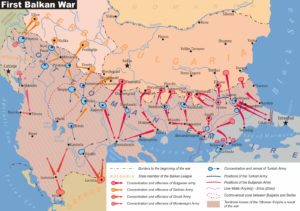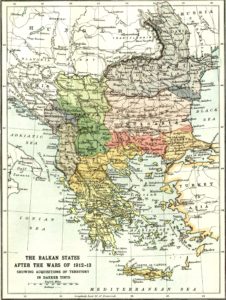The Prequel – The First & Second Balkan War
Every school child knows that the spark that ignited the conflagration of WWI came from the Balkans, when Archduke Franz Ferdinand was murdered by the Black Hand. However, a more nuanced telling of events can help us understand the importance of the Balkans in shaping the First World War.
Origins & the First Balkan War
In the years preceding WWI, the Balkans was a hotbed of conflict, provoked by both internal and external factors. The Ottomans, who had ruled over the Balkans for three centuries, had begun to lose their grip on the region in the mid-1800s in the face of resurgent ethnic and sectarian nationalism.

The Italo-Turkish War of 1911-12 resulted in the Italians gaining control of Libya in October 1912. The same month the Balkan League, composed of Bulgaria, Serbia, Greece and Montenegro, declared war on the beleaguered Ottoman Empire. They quickly made progress. A sustained advance by the League led to the Greek seizure of Salonika in November 1912 and the start of the siege of Edirne (Adrianople) by the Bulgarians. Soon Bulgarian war planes were scouting the Chatalja line, the ring of fortifications which protected Constantinople, a city now filled with retreating Turkish forces. The siege of Edirne lasted five months and in March 1913, the Bulgarians took the city. This effectively ended the First Balkan War.¹ This map shows the war and its aftermath in respect of territory lost by the Ottoman Empire.*
Emmerson recounts the European reactions to the conflict and their influence upon the resulting Treaty of London: Russia, although pleased by the Ottoman defeat, saw Constantinople as their future prize and did not want to see the Bulgarians in possession of the city. Austro-Hungary worried about the growing strength of Slavic Serbia and Montenegro and the potential this had for fostering unrest within their own Slavic minority population. Germany, a long time Ottoman ally, sought to ensure that their regional partner was not completely weakened. Meanwhile, Britain worried about Christian armies expelling Muslims and the danger of this causing unrest in India.
The Second Balkan War
The peace brought by Treaty of London was short-lived. The Balkan League now fell out amongst themselves over the distribution of the spoils of war. At the centre of this disagreement was the division of Macedonia amongst the Greeks, Serbs and Bulgars. Serbia and Bulgaria already had a pact determining the split, but with the creation of Albania and Serbia’s occupation of northern Macedonia, this arrangement wouldn’t stand.
Secret machinations led to a Greek and Serbian alliance which sought to exclude Bulgaria from Macedonia. Bulgaria declared war on its former allies in June 1913 in what was to become the Second Balkan War. Romania, which also had a border dispute, joined in against Bulgaria. The fighting was short-lived and, with Romanian troops approaching Sophia, the Bulgarians sued for peace.
Aftermath

Serbia emerged as the biggest winner and, backed by French-financing, the most powerful of the Balkan states. Its territories grew by 80% and its population by 1.5 million. However, its repression of its new, non-Slavic subjects was to be the subject of much scrutiny and comment in the coming year.
The biggest loser was Bulgaria which lost greatly in terms of men and territory. Turkey took the opportunity to recapture Edirne. Serbia secured northern Macedonia and Greece claimed southern Macedonia, including Salonika. Romania secured much of Bulgaria’s recently-won territory in the area of Dobruja. This map shows the redrawn borders – the darker colours denote territorial gains.
Consequently, the impact of these events upon the First World War were significant. The First and Second Balkan Wars had sown seeds of both resentment and possibility across the region. The Bulgarians felt especially hard done to. In the coming war each of the Balkan states was therefore highly aware of the fragility of their recent gains or losses. They would seek to ally themselves with the side that would most likely protect or reverse the recent territorial shifts. This ensured that diplomacy would prove as decisive as military strength in the wooing of the Balkan states.
References & further reading
¹ ‘1913 – In Search of the World Before the Great War’ by Charles Emmerson (PubicAffairs 2014)
* Map is original work and its copyright owned by Kandi. First Balkan War Wikipedia
** ‘Balkans in 1913’ Author Sp. Markezinis. In the public domain due to its age. From Wikipedia

